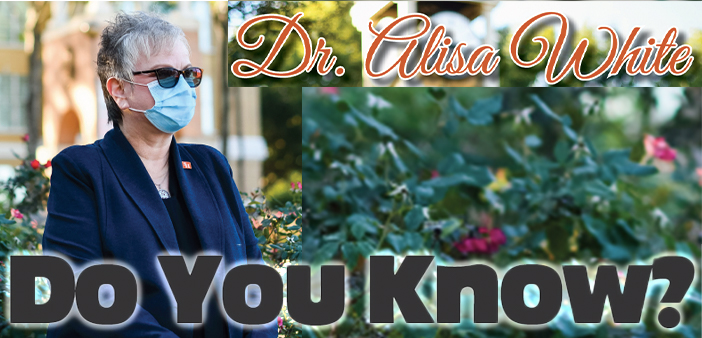


Photos by Libby Rogers
When Bob, a correctional officer with the Texas Department of Criminal Justice, happened to pass by a horrific automobile accident in late 2019, he witnessed a gruesome, bloody scene. Later, the image popped into his mind without warning, and he began to hyperventilate. He thought momentarily he might be having a heart attack, but his wife correctly suggested he was experiencing a panic attack. Over the next few months, he had occasional panic attacks when he saw someone bleeding. Knowing he might have to deal with the sight of blood while on the job, he was concerned. What if he had a panic attack while on the job? Bob worried about this scenario so much that he actually had panic attacks because he was worried about having panic attacks.
Bob began to search the internet desperately, and he soon stumbled upon Sam Houston State University’s Psychological Services Center. The center’s website noted that, because of the pandemic, telehealth appointments were available. Bob also discovered the center utilizes a sliding fee scale based on income. Encouraged, Bob called. He learned clients like him have had remarkable success with self-help techniques, and he scheduled a telehealth appointment. After four sessions—which cost him just $13 each—he felt confident he could manage any future panic attack.
Although Bob is not a real person, his story is typical of clients who seek help at SHSU’s Psychological Services Center. Panic attacks are common, says Dr. Mary Alice Conroy, a professor of psychology and the director of the center. While some people can identify a trigger, other sufferers have panic attacks without warning. There is, however, good news: self-help techniques are highly effective. Although providers are trained to guide clients through as many as 12 sessions, most clients have the problem under control in far less time. “I have never had a client get past the sixth session,” says Dr. Darryl Johnson, a staff psychologist at the center. “Usually by the fourth session, they improve so much they say, ‘I don’t need this anymore. I feel like I’ve got it.’”
A dual mission
SHSU’s Psychological Services Center was created in 1999. There, doctoral students in psychology see clients under the close supervision of licensed psychologists. “Our primary mission is to train the next generation of clinical psychologists,” Conroy says. “Our second mission is to provide services to the community.” Remarkably, the center has provided services to residents of 23 nearby counties, including Grimes, Polk, and Leon counties. “All those many counties are within driving distance,” she says.

Clients who utilize the center’s services can benefit from the latest techniques in the field of psychology. “Psychology is a rapidly-developing field, so there are new treatments that are coming out every few years; someone who is not staying on top of those may be unaware of some of the available treatments,” Johnson says. “The belief persists that therapy involves talking about your problems with a therapist once a week for an hour and then going about life, and for some, that has been their prior experience. Our interventions are much more directive and involve work between sessions. Because we are a university training center, faculty are obligated to use the most up-to-date, well-researched interventions available.”
Turning a profit is low on the center’s list of priorities. In fact, one of its goals is to provide services to underserved members of the community, and the center even offers sessions in Spanish. Although the cost varies by clients’ income, the average session is just $13—a fraction of the average cost of seeing a psychologist elsewhere in the community. This low economic burden can be particularly appealing to people who need to undergo assessments. For example, if a parent suspects a child has a learning disability, having it diagnosed can be expensive. In addition to the cost of testing materials, most assessments take many hours of a professional’s time. It’s not unusual, Johnson says, for an assessment to cost $2000. At the SHSU Psychological Services Center, the average assessment costs $153. Once a student is equipped with an assessment report, he or she can receive educational accommodations—even in college. “The evaluation basically outlines the person’s strengths and weaknesses,” Johnson says. “Most colleges have on-campus tutoring and assistance, and students can get more time on tests and can be tested in isolated testing rooms. They can get note-taking assistance and can be allowed to record lectures.”

The center also provides assessments that can help diagnose psychological problems. Such assessments can help clients understand what is causing their symptoms, says Sarah Barksdale, a doctoral student who works at the Psychological Services Center. “It can explain what’s happening. Do they have depression, anxiety, a conduct disorder? That’s another kind of assessment that we do.”
Therapy, however, is the most common request at the center. “We are very much in the business of providing general therapy services for a broad range of problems,” Conroy says. While the center sometimes identifies conditions that require medication, like schizophrenia or bipolar disorder, staff at the Psychological Services Center are willing to make referrals and work alongside physicians to maximize quality of care. However, many problems—such as anxiety, mood swings, depression or post-traumatic stress disorder—can be treated by teaching psychotherapeutic techniques to clients. “You don’t need a prescription to use them. Once you have them, you can use them for the rest of your life, and you can come back to brush up on the skills,” Johnson says. The center can also help people who are struggling with life disturbances, such as dealing with the loss of family members through death or divorce.
Life problems during a pandemic
Because few, if any, Americans remember the 1918 pandemic, Conroy says, virtually all of us are dealing with issues we’ve never faced before. “Life hasn’t stopped just because we have a lockdown,” Johnson says, “and on top of that, we have increased stressors, like health, job security and isolation. People have more time with their own thoughts and fears, and less time to discuss those with others. And there are many support systems they can’t utilize. A lot of times there are some substance issues. You are stuck at home, and you don’t have anything to do. People who struggle with substance abuse—this is a horrible time for them.”
“It is a difficult, isolating experience,” Barksdale agrees. “We get a lot of calls about people struggling at home. There are things they haven’t experienced before. People call because their functioning is not where it should be. For whatever reason, there has been a motivating factor that they want to better themselves. We are really good at tailoring our treatments to the individual and really fostering a welcoming environment for all phases of life.”

Life during a pandemic can be especially stressful for first responders and medical personnel. “During a pandemic, they’re always essential,” Johnson says. “Are they going to bring this home to an elderly parent? They aren’t able to avoid infection, and there is a lot of stress involved in that.”
To help first responders and medical personnel during this difficult time, the Psychological Services Center now offers a reduced fee schedule for sessions. “We have low rates anyway,” Conroy says, “but rates are even lower for first responders and medical personnel.”

If a person is hesitant to receive services through his or her employer, getting help at the SHSU Psychological Services Center can be an ideal solution. Sessions may be accomplished either via a telehealth platform or by in-person visits, and the students and supervisors at the center go to great lengths to ensure sessions are kept completely confidential. “The really nice thing about our facility is we have our own building on the edge of campus, we have our own parking lot, and we have our own waiting room,” Conroy says. “It’s very private.”
Meanwhile, the telehealth platform has been so successful, the Psychological Services Center plans to keep it as an option, even after the need for social distancing is an unpleasant memory. In the future, Conroy says, both in-person and telehealth visits will be available to clients.
Still, some people avoid asking for help because they perceive others might hold a negative view of those who seek mental health services. “There are groups of people who still think of it as a stigma,” Conroy says. “They have the feeling that they are weak if they come in for services.” She vehemently disagrees. “You are strong if you come in for services! You say, ‘I have a problem, and I am working on it. I am going to take responsibility for my problem. And I want to come in for services.’”
For more information about
SHSU’s Psychological Services Center,
call 936-294-1210.



